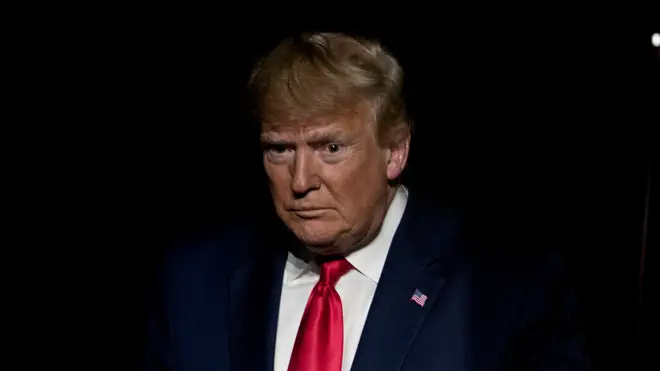
James O'Brien 10am - 1pm
3 January 2020, 15:09

LBC's Washington Correspondent Simon Marks says although there was "every reason" for the US to authorise the killing of General Qassem Soleimani, President Trump has leapt "headlong" into a "full-scale national security crisis."
It is only the third day of the new year, but it is now absolutely apparent that 2020 is going to be an entirely different ballgame for President Donald Trump.
For three years, members of the foreign policy establishment in Washington have thanked their lucky stars that the President has not stumbled into a full-scale national security crisis.
But last night President Trump leapt headlong into one.
With the firing of the drone missiles that assassinated General Qassem Soleimani, commander of Iran’s elite Quds Force, the President dramatically raised the stakes in the region for the US forces and diplomats based there, for American businesses and journalists operating there, for western shipping sailing there and for citizens from allied nations - including Britain - residing there.
Make no mistake: there was every reason to authorise the elimination of General Soleimani, a man with gallons of blood on his hands who had bedevilled successive American Presidents, Israeli Prime Ministers and Saudi Kings.
As Iranian exiles based in Britain have demonstrated through their calls to LBC today, political opponents of the regime and General Soleimani’s close friend, Iran’s Supreme Leader Ayatollah Ali Khamenei, are delighted by President Trump’s actions.
Sanctioned by the United States back in 2005, successive American governments branded the General and the Quds Force as the principle architects of global terror emanating from Iran.
And the Quds Force had Iranian foes of the regime in their crosshairs even more than they targeted foreign nationals.
But the missile that slammed into the General’s convoy last night was not accompanied by any kind of cogent, coherent US strategy.
President Trump - ill-equipped at the best of times to navigate the complexities of a hostile Middle East - is now surrounded by yes-men.
The moderately-restraining influences that tied his hands earlier in his Presidency are long gone.
Today, his principal cohorts are Secretary of State Mike Pompeo - a man who has never slayed the national security establishment with the size of his foreign policy acumen - and the newly-minted National Security Adviser Robert O’Brien.
Only last weekend on television here, Mr, O’Brien seemed unaware that when referring to North Korea’s Kim Jong Un, you call him “Chairman Kim”, not - as he put it - “Chairman Un”.
Meanwhile, the President’s Defence Secretary Mark Esper is busy grasping onto the Pentagon’s revolving door with his fingernails.
Over the last three years it’s been spinning with the velocity of a spin dryer. The State Department has been completely hollowed-out, with foreign policy experts departing the administration at equally high speed.
It’s a mystery, then, who will guide the President through the very hazardous thicket his actions last night have created.
He can also expect hostile questioning from Capitol Hill where the President’s fellow Republicans - already furious with him for green-lighting Turkey’s invasion of northern Syria last year - will want to understand precisely what risk-versus-reward calculations the administration made before killing the General.
Suddenly, we’re in a very different world. Iran, no longer constrained by the President’s decision to pull out of the multilateral nuclear deal, will feel no compunction about retaliating for the US strike.
The only questions now are when, where, and who will Tehran target as it hits back.
Spare a thought, by the way, for the UK's Nazanin Zaghari-Ratcliffe and other westerners languishing in Iran’s jails. Today’s developments almost certainly shatter any prospect of meaningful negotiations to secure their release.
So buckle up. It’s going to get very ugly out there. And President Trump is virtually alone at the steering wheel now. The few qualified drivers ever involved in his administration departed the vehicle a long time ago.